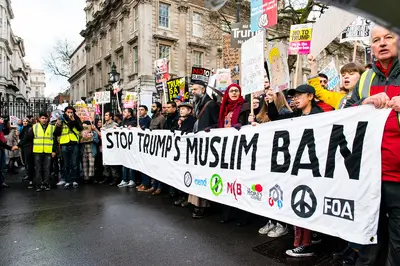By Brian Figeroux, Esq. | Editorial credit: John Gomez / shutterstock.com
Click here to know your rights.
Immediately taking office on January 20, 2025, President Donald Trump has signaled an ambitious agenda to reshape U.S. immigration policy through a series of executive orders. These directives are expected to have profound implications for documented and undocumented immigrants residing in the United States. This article analyzes the anticipated executive orders and their potential impact on immigrant communities.
- Mass Deportations
One of the most significant actions President Trump plans to undertake is the initiation of mass deportations targeting undocumented immigrants. Tom Homan, the designated border security official, announced that nationwide raids are scheduled to commence shortly after the inauguration.
This initiative aims to deport millions of individuals without legal status, marking one of the largest deportation operations in U.S. history.
Impact on Immigrants:
- Family Separations: The enforcement of mass deportations is likely to result in the separation of families, particularly affecting mixed-status households where some members are U.S. citizens or legal residents. The psychological and emotional toll on families, especially children, could be substantial.
- Economic Disruption: Undocumented immigrants contribute significantly to various sectors of the economy, including agriculture, construction, and service industries. Their removal could lead to labor shortages, affecting productivity and leading to potential economic downturns in certain industries.
- Community Trust: Increased immigration enforcement may erode trust between immigrant communities and law enforcement agencies, making individuals less likely to report crimes or cooperate with investigations, thereby compromising public safety.
- Ending Birthright Citizenship
President Trump has expressed intentions to sign an executive order ending birthright citizenship for children born in the U.S. to undocumented immigrants or those on temporary visas. This move challenges the interpretation of the Fourteenth Amendment, which has historically granted citizenship to anyone born on U.S. soil.
Impact on Immigrants:
- Legal Uncertainty: Revoking birthright citizenship would create a class of individuals born in the U.S. without citizenship, leading to legal ambiguities regarding their rights and status.
- Statelessness: Children born to undocumented immigrants may become stateless if they do not acquire citizenship from their parents’ country of origin, resulting in a lack of legal protection and access to essential services.
- Increased Marginalization: Without citizenship, individuals may face barriers to education, employment, and social services, exacerbating marginalization and inequality within society.
- Reinstating the ‘Muslim Ban’
The administration plans to reinstate the travel ban affecting individuals from specific Muslim-majority countries, a policy initially implemented during President Trump’s first term.
Impact on Immigrants:
- Family Reunification: The travel ban would hinder the ability of families to reunite, affecting those seeking to join relatives in the U.S.
- Humanitarian Concerns: Refugees fleeing persecution may find it challenging to seek asylum in the U.S., potentially leaving vulnerable populations without safe haven.
- Perception of Discrimination: Targeting specific countries could foster perceptions of religious or ethnic discrimination, impacting the social cohesion and sense of belonging among affected communities.
- Suspension of Refugee Admissions
The administration intends to suspend refugee admissions, reversing policies that had increased the number of refugees allowed into the U.S.
Impact on Immigrants:
- Resettlement Agencies: Organizations involved in refugee resettlement may face operational challenges and funding shortages due to reduced admissions.
- Refugee Populations: Individuals in refugee camps or conflict zones may experience prolonged displacement and uncertainty without the prospect of resettlement in the U.S.
- Enhanced Border Security Measures
Plans include shutting down the U.S.-Mexico border and implementing stringent border security measures to prevent illegal crossings.
Impact on Immigrants:
- Asylum Seekers: Individuals seeking asylum may be denied entry, potentially violating international humanitarian obligations.
- Cross-Border Communities: Communities and economies that rely on cross-border movement may suffer due to restricted access and increased enforcement.
- Termination of DACA Protections
While not explicitly stated in recent announcements, the administration’s stance suggests a potential termination of the Deferred Action for Childhood Arrivals (DACA) program, which protects individuals brought to the U.S. as children from deportation.
Impact on Immigrants:
- Loss of Legal Status: Approximately 700,000 DACA recipients, known as Dreamers, could lose protection from deportation and work authorization, disrupting their lives and contributions to society.
- Educational and Employment Opportunities: Dreamers pursuing education and careers may face uncertainty and barriers, affecting their personal development and economic stability.
Conclusion
The anticipated executive orders represent a significant shift in U.S. immigration policy, emphasizing enforcement and restriction. The impacts on immigrant comm
unities are multifaceted, affecting legal status, family unity, economic participation, and social integration. As these policies unfold, it is crucial to monitor their implementation and advocate for approaches that balance national security concerns with humanitarian principles and the foundational values of the United States.

